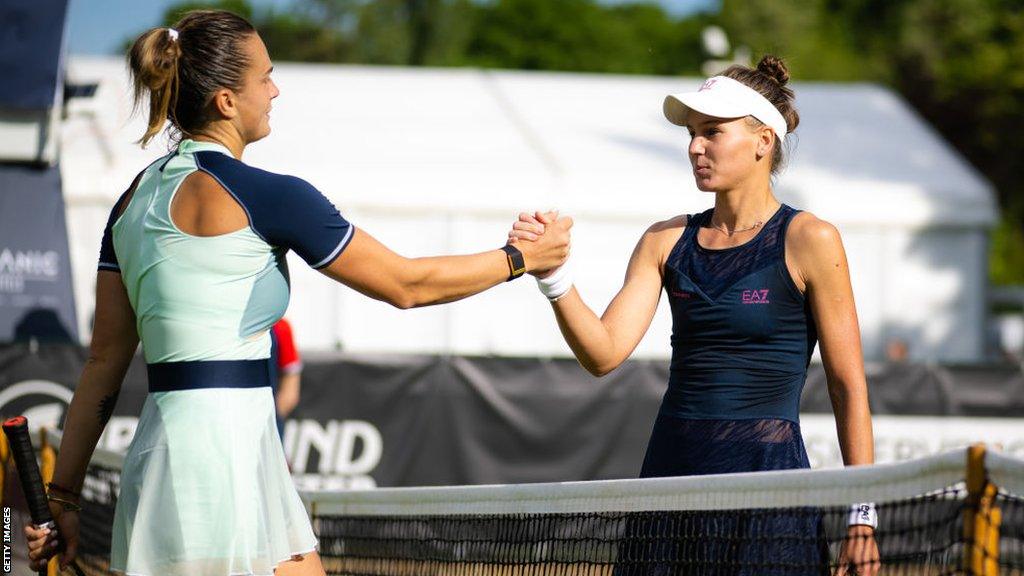Wimbledon 2023: What are rules for Russians and Belarusians?
- Published

World number two Aryna Sabalenka (left) and number 12 Veronika Kudermetova (right) are among those scheduled to be back at Wimbledon this year
Wimbledon will fall in line with the other Grand Slams next week, when Russian and Belarusian players are once again able to compete for the title.
Barred last year in the immediate aftermath of the invasion of Ukraine, their participation this year was dependent on signing a personal declaration of neutrality.
This means they cannot express support for the invasion, or for the leadership of either Russian president Vladimir Putin or Belarusian counterpart Alexander Lukashenko.
They cannot "wear or be seen with any item containing an image, symbol, flag, insignia or emblem" which might indicate support for the war or the Russian and Belarusian regimes.
Players may also not be in receipt of funding from either state, or from companies operated or controlled by sanctioned individuals.
BBC Sport understands the language of the declaration was strengthened last month to ensure athletes with contracts of this kind provide evidence the arrangement has been terminated.
The United Kingdom government was the driving force behind the change, which will have to be policed during the championships by the All England Club.
The rules have been tightened with Russia's Veronika Kudermetova very much in mind. The 26-year-old world number 12 is sponsored by one of the country's oil and gas giants Tatneft. In June of last year, a subsidiary of Tatneft - which supplied tyres to the Russian army - was sanctioned by the European Union, although that subsidiary has since been sold by the oil and gas company.
Kudermetova has been wearing Tatneft's logo on her chest on the women's WTA Tour, and may have originally thought it would simply be a case of removing it.
"For the moment, I don't break a rule," she said at this year's Madrid Open.
"For Wimbledon, yes, I know we are not allowed to wear badges from our country. If I would like to play Wimbledon, I need to take the badge off."
Any player wearing a Russian or Belarusian football shirt will also find themselves in trouble - especially if it is the shirt of a military-affiliated club like CSKA Moscow.
World number 22 Anastasia Potapova was given a formal warning by the WTA for wearing a Spartak Moscow top before a match against Jessica Pegula at Indian Wells in March.
"This was not acceptable, nor an appropriate action. We do not expect to see any reoccurrence of this in the future," the WTA said in a statement. World number one Iga Swiatek said Potapova should have realised it was unwise to show her support for the club at a time such as this.
The championships' referee Gerry Armstrong will be the main arbiter of whether any rules are broken.
"I accept that any violation of the above conditions may result in the removal of my accreditation (and denial of the right of participation in The Championships)," the declaration reads.
And there could be further repercussions, if any violation of the rules is deemed unsportsmanlike conduct or even a "major offence" under Grand Slam rules.
Russian and Belarusian players have been repeatedly quizzed about their stance on the war.
World number three Daniil Medvedev has frequently stressed he is "for peace all over the world," but not felt able to condemn the invasion in stronger terms.
Many have expressed similar sentiments, although his friend and world number seven Andrey Rublev did write "no war please" on a camera lens after winning a match in Dubai at the very beginning of the conflict.
Australian Open champion Aryna Sabalenka skipped two media conferences at the recent French Open after a series of questions about her own political beliefs. When she returned to the room she emphasised she did not support the war, and therefore also did not "support [Belarusian president] Lukashenko right now".
Ukrainian players have often been scathing about the careful words chosen by some, but they view Russia's number one Daria Kasatkina in a different light. They may not shake her hand at the end of a match, but are grateful for the comments she had made about the war, which she once described as a "full-blown nightmare".
Spectators planning to attend the championships, which run from 3 to 16 July, should be aware all Russian and Belarusian flags and associated imagery will be banned from the grounds.
At January's Australian Open, Novak Djokovic's father Srdjan was filmed - unwittingly, his son later said - posing for photos with a man holding a Russian flag bearing Putin's face. He was also wearing a T-shirt printed with the pro-war Z symbol.
All members of a player's entourage are subject to the same rules. The visa application process appears to have gone smoothly, with the majority having been processed two weeks before the championships began.
And now we wait to see whether everyone abides by the declaration they signed as a condition of entry.

The shocking impact of commercial whaling: Top-secret Soviet whaling reports record the unimaginable number of whales killed
Why did Jimmy Carr start his career all over again?: He reveals it all to Steven Bartlett in The Diary of a CEO

